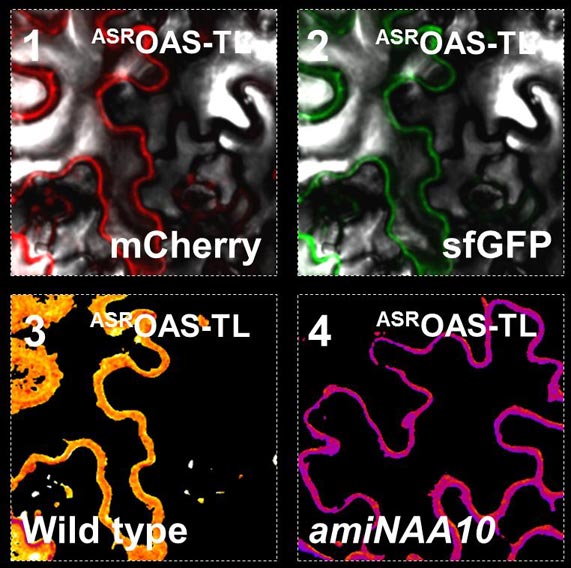Protection from the Molecular Shredder

NatA substrates are destabilised in plants if their intrinsic N-degron is not masked by acetylation | Linster et al., Nature Communications (CC-BY 4.0)
Heidelberg plant researchers discover cellular mechanism that extends the life of proteins.
Plants are tied to one location and need to adjust to their environment, including adverse conditions. Adaptive responses include synthesising new proteins and breaking down those that are no longer needed. For this task, plants use a considerable amount of energy. Thus, regulation of protein turnover in the plant cell has to be appropriately thorough. Researchers at the Centre for Organismal Studies of Heidelberg University led by Dr Markus Wirtz and Prof. Dr Rüdiger Hell have now identified a cellular mechanism that stabilises proteins by preventing their breakdown.
Plants contain numerous proteins that are needed to adapt to environmental conditions like drought stress. Because their production takes a lot of energy – about half of their energy requirement – plants must precisely regulate protein turnover. To understand how this occurs, the Heidelberg researchers, in collaboration with partners from the Max Planck Institute of Biochemistry in Martinsried and Sapienza University in Rome (Italy), studied thale cress (Arabidopsis thaliana). Thale cress belongs to the family of Brassicaceae and serves as a reference plant due to its short lifetime and simple genome.
According to the researchers, plants tag proteins while they are synthesised by attaching an acetic acid residue at the beginning of the protein. This process affects more than 80 percent of all plant proteins and is known as N-terminal acetylation. Despite its prevalence, the impact of acetylation was unclear for a long time. The Heidelberg researchers were now able to demonstrate that it protects a majority of the proteins from breaking down through the so-called proteasome, hence prolonging their life. “The proteasome is a molecular shredder that degrades damaged or no longer needed proteins into their building blocks for re-use,” explains Prof. Hell.
In genetically altered plants with a reduced protein acetylation rate, Dr Wirtz’s team verified substantially increased proteasome activity, accompanied by accelerated protein degradation. To the astonishment of the researchers, however, the total quantity of proteins within the plant cells remained unchanged. Markus Wirtz: “Plants compensate for the loss of non-acetylated proteins by synthesising new proteins, probably to dynamically adapt the protein composition in response to environmental stimuli.”
The plant researchers’ findings may be applicable to human cells. They also have a very similar mechanism to chemically modify and acetylate numerous proteins. “Acetylation appears to be an ancient mechanism that arose several billion years ago in the earliest ancestors of all eukaryotic organisms – organisms which have a true nucleus and a high degree of sub-cellular compartmentalisation,” says Prof. Hell.
The German Research Foundation is funding the basic research on protein acetylation in Heidelberg. The results of the study were published in the journal “Nature Communications”.
Contact:
Heidelberg University
Communications and Marketing
Press Office, phone +49 6221 54-2311
presse@rektorat.uni-heidelberg.de
Wissenschaftliche Ansprechpartner:
Dr Markus Wirtz
Centre for Organismal Studies
Phone +49 6221 54-5334
markus.wirtz@cos.uni-heidelberg.de
Prof. Dr Rüdiger Hell
Centre for Organismal Studies
Phone +49 6221 54-6284
ruediger.hell@cos.uni-heidelberg.de
Originalpublikation:
E. Linster, F. L. Forero Ruiz, P. Miklankova, T. Ruppert, J. Mueller, L. Armbruster, X. Gong, G. Serino, M. Mann, R. Hell and M. Wirtz: Cotranslational N-degron masking by acetylation promotes proteome stability in plants. Nature Communications (10 February 2022), doi: 10.1038/s41467-022-28414-5
Weitere Informationen:
http://www.cos.uni-heidelberg.de/en/research-groups/molecular-biology-of-plants/… – Working group of Markus Wirtz
http://www.cos.uni-heidelberg.de/de/forschungsgruppen/molekulare-biologie-der-pf… – Working group of Rüdiger Hell
https://www.uni-heidelberg.de/en/newsroom/protection-from-the-molecular-shredder – Press release
Media Contact
All latest news from the category: Life Sciences and Chemistry
Articles and reports from the Life Sciences and chemistry area deal with applied and basic research into modern biology, chemistry and human medicine.
Valuable information can be found on a range of life sciences fields including bacteriology, biochemistry, bionics, bioinformatics, biophysics, biotechnology, genetics, geobotany, human biology, marine biology, microbiology, molecular biology, cellular biology, zoology, bioinorganic chemistry, microchemistry and environmental chemistry.
Newest articles

Largest magnetic anisotropy of a molecule measured at BESSY II
At the Berlin synchrotron radiation source BESSY II, the largest magnetic anisotropy of a single molecule ever measured experimentally has been determined. The larger this anisotropy is, the better a…

Breaking boundaries: Researchers isolate quantum coherence in classical light systems
LSU quantum researchers uncover hidden quantum behaviors within classical light, which could make quantum technologies robust. Understanding the boundary between classical and quantum physics has long been a central question…

MRI-first strategy for prostate cancer detection proves to be safe
Active monitoring is a sufficiently safe option when prostate MRI findings are negative. There are several strategies for the early detection of prostate cancer. The first step is often a…



